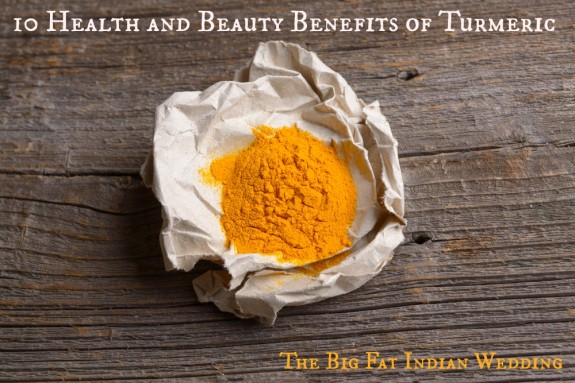If you’ve ever eaten Indian food, you’re familiar with that bright yellow spice that seems to find its way into every dal and subzi. Turmeric, or haldi, is a root plant (similar to ginger) that gives off a slightly bitter, mustard taste. It’s a necessity in Indian cooking, but did you know it’s handy for health and beauty benefits too?
It’s important to keep in mind that turmeric is used as an alternative medicine, and it has many Hindu ayurvedic uses. While no solid scientific research has substantiated its health benefits, turmeric has many natural, healing traits that have been tested in supplemental and alternative forms in Asian societies.
Curcumin, the main active compound in turmeric, has many properties ranging from healing to disease prevention. Here are 10 benefits of the turmeric spice:
1. Anti-inflammatory
The curcumin in turmeric is strongly anti-inflammatory. When applied to a burn wound, curcumin fights inflammation at a molecular level, preventing an overreaction of our cells to an attack. This is probably why the Old Aunties’ Club shouts, “Put some haldi on it!” in response to a kitchen burn.
2. Brightening Skin
As we know, haldi is a common ceremony in Hindu weddings. The ritual consists of applying thick turmeric paste to a bride’s face, arms, and legs so that her skin is glowing on her big day. Turmeric brightens the skin without bleaching it, and allows for easier removal of dirt and oils. The result is a bright, blushing bride!
{via The Haldi Ceremony at a Hindu Wedding}
3. Antioxidants
Curcumin is also heavily infused with antioxidants, which we know as strong warriors in the battle against aging. The compound can neutralize reactive molecules in our bodies that cause aging and skin damage in the first place, making the unwanted process slow down a bit.
4. Lowers risk of brain diseases
Many common brain disorders, including Alzheimers, are linked to decreased levels of a specific growth hormone called BDNF. Although not totally proven, curcumin can lead to increased levels of this hormone, and it has been believed to improve memory retention as well.
5. Lowers risk of heart diseases
Heart diseases are caused by a variety of factors, including blood pressure and clotting. Curcumin’s ability to decrease inflammation and increase oxidation in blood helps to prevent some of these diseases caused by these unchecked effects.
6. May help prevent/treat cancer
Did you know Ancient Chinese medicine used curcumin as a treatment for cancer patients? High doses of curcumin can reduce the growth of new, cancerous blood vessels in tumors and can slow down metastasis, the spread of the disease. Of course, this means using a much higher concentration of turmeric, alongside other medicines.
{via medherb.com}
7. Helps treat arthritis
Since curcumin has anti-inflammatory properties, it tends to be a great treatment for arthritis and joint pains. Turmeric can be applied as a powder or a paste directly to the ailing joint for immediate, albeit mild, relief.
8. Antidepressant qualities
Curcumin’s link to boosting BDNF hormone levels has also been linked to treating signs of depression. The increased presence of the hormone can combat effects of depression, such as lower learning and memory-retention abilities.
9. Anti-aging properties
The anti-oxidants in turmeric, as well as those handy skin-brightening abilities, make the spice an effective tool against aging. The anti-inflammatory nature of curcumin also helps reduce some of the under-eye puffiness that can reveal signs of age. Overall, turmeric masks sound like a routine that shouldn’t be limited to brides.
10. Speeds up skin healing
As mentioned before, the anti-inflammatory and oxygen circulation agents in turmeric are useful for wound-healing. This includes the particularly fragile skin. Turmeric can be applied directly to a closed wound to speed up the skin’s natural healing process.
Indian cooking and wedding rituals have used turmeric for ages, but the recently proven health benefits imply the spice is making a greater comeback. In order to utilize some of these amazing medicinal qualities, turmeric (and its magic ingredient curcumin) can be ingested in higher quantities.
Some suggestions on how to incorporate turmeric into your diet or beauty regime include: drinking turmeric as a tea (consider adding ginger or lemon for taste); making haldi into a face mask (add some essential oils for extra skin benefits); or taking a direct turmeric dietary supplement (found in most health stores).
Happy haldi-using!
{Info via medherb.com, authoritynutrition.com, and organicindia.mercola.com}


